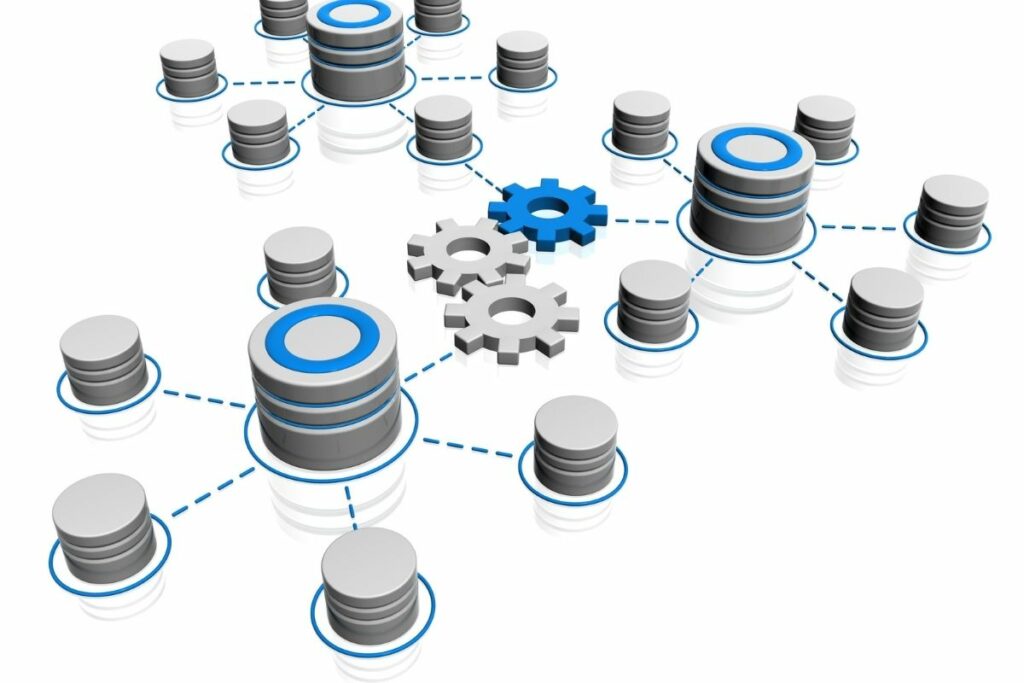
Databases are some of the most useful tools in today’s world. The modern world relies on the data collated together and then sent out to one another through our various tools and electronic devices.
Every purchase you make by your card is a bundle of data sent to a server for processing, every video you watch on YouTube, every song you listen to, every text you send on your phone, all of it is just bundles of data being sent around in cyberspace.
With so much data flying around every second of every day on our planet, it would be impossible for people to manage on their own. This is where databases come in.
A database is essentially a systematic collection of data that is organized and stored in a manner that is supposed to be convenient and easy to access.
Without databases, it would be impossible for our world to function as it is today. Even something as simple as watching a Netflix documentary would be out of the realm of possibility.
Yet, that doesn’t mean that databases are infallible, and they can only function within the bounds of their intended purpose if we can actually use them well.
Therefore, it is important to know which databases you may want to use for your company. As such, here is our pick for the best database software currently available.
Knack
Knack was started in 2010 by Brandon Griggs and Eric Katherman as a SaaS company.
The idea came about when they were working at their web design company, as customers would approach them about further features on the website beyond the standard that was made for them, and they would have to code all these features from scratch.
In light of this, they built knack in order to simplify the creation of online databases and allow customers to change them without needing prior programming knowledge.
This simplified technology has meant that knack has exploded in popularity and is one of the most popular online databases that companies use.
The absolute best thing about Knack is that it is really easy to use. You don’t need prior programming experience, and you don’t need in-depth software knowledge. You just require a laptop or computer.
The reason for this is that Knack has a database building tool that is designed for ease of use and has a step-by-step guide on how to use it.
Further to this, Knack offers the opportunity to use templates when building a new database. These templates are set up so that no matter how out of your depth you are, you can always find something that will lead you back to the shore.
Normally, people associate simplicity with a lack of security or an easily breached system, but that is not the case with Knack.
The administrators of the database that your company is using through Knack can create user permissions and only those users can access it. This keeps all your information available for only those you want to see it.
Knack also has a multi-integration feature as well, and it can share data or information with a variety of different apps, even including payment providers.
However, this integration can sometimes be a bit finicky and its broad scope of being able to integrate with so many and complex systems may be a bit of an overreach at points.
Still, Knack is some incredible piece of database software trusted by huge companies, like HP and Capital One.
Even with some issues on the integration front, the company’s constant hard work and perseverance have meant that they have ironed out most issues, and they will continue to do so in the future.
Pros:
- Insanely easy to use.
- Good security.
- Versatile for most situations.
- Very good quality.
Cons:
- Has some teething issues with integration.
Improvado
Improvado was started in 2015 by Daniel Kravtsov in San Francisco. It was intended as a database software tool specifically for marketing data, in order to help aggregate that data for small and large businesses in real time.
In essence, it acts as the middleman between the consumer and the provider company of content. Although it was started only a short while ago, Improvado has gained a major following among many companies, especially internet titans with a need for constant advertising.
Although not quite as beginner-friendly as Knack, Improvado is still very easy to use with limited knowledge. The whole database is designed so that the user can customize the ways in which they measure and use the data, while still maintaining a very detailed and in-depth method of data collection.
The security is tight with Improvado and on the rare occasion there are problems, the customer support is ready, willing, and able to help most of the time.
This competency also extends to the engineering team, who are very experienced and dedicated to get your database working again. There are also options to have backups and data recovery software for your database, in case of a serious concern.
Improvado is constantly being updated and provides the customer frequent updates on their projects.
This, combined with the ability to analyze the metrics for aides in making decisions, means that Improvado is very versatile and even if situations change rapidly, then you can adapt easily thanks to their help.
Though Improvado is great, there are a couple of issues. This database software is primarily a tool for marketing purposes and while it is great in this area, it does kind of limit what the software can do if you wanted to use it for a different industry.
Another point to make is that since everything about the database is owned and managed by Improvado, it can be a little difficult to either update or to test your own adjustments.
Say if you wanted to add a new template, you would have to go through Improvado first and that can take time for something that should be longer than thirty minutes.
Pros:
- Quite easy to use.
- Very good security.
- Quite versatile in its own industry.
- High quality database.
Cons:
- Limited to the marketing industry.
- Not conducive to creating your own work.
Microsoft Azure SQL
Everyone knows the technology supergiant, Microsoft. Started in 1975 by Bill Gates and Paul Allen, Microsoft originally produced operating systems, but has branched out over the years to encompass anything relating to software or hardware in electronic devices.
This has included database software and in 2008 they launched Microsoft Azure, which is a cloud computing system for application management. Since that day, Azure has continued to be used throughout the industry and has only gotten better with time.
Part of the reason companies use Azure over other services, even if they get more from the other services, is the unique pay system. Azure is a pay per-feature service, or more accurately a pay as you go service.
For many businesses, they don’t use the full extent of features on a database, because they don’t need to. With Azure, this isn’t a problem, as you only pay for the things that you will use.
This is done through a credit system, in which you receive credits when you sign up and those credits are used to access different features. If you don’t use the feature, you don’t use any credits or money to pay for it.
One of the best things about Azure is that it has a machine learning AI part to it. This AI automates a lot of the different parts of the software, helps installation and maintenance of the database for the businesses that use it.
Thanks to the design of the software to have features for whatever you pay for, it is incredibly adaptable. It can handle lots of SQL and other database queries and is still very powerful, while offering the versatility that most businesses seek.
Azure doesn’t promise the world in its software, just a powerful database, it delivers one which is great.
The issue is that having a pay as you go pricing system can make it confusing for new customers, and some people may accidentally buy features they didn’t want. Apart from that, though, Azure is a great system to work with.
Pros:
- AI helps make systems easy.
- Versatile and adaptable for a wide range of complex issues.
- High powered and high quality.
- Cool pay as you go pricing features.
Cons:
- Pricing can be a little confusing.
IBM Informix
Very much Microsoft before it, IBM is one of the major names in the computing business, except far older. IBM was founded in 1911 by Charles Flint, making it one of the oldest computer companies still in the game.
In fact, without IBM we would never have got the ATM, the hard disk drive, or SQL itself. Informix was originally its own company, but it was bought out by IBM, who turned it into the major database software provider it is today.
The first thing to say about Informix is that it is state of the art and cutting edge. The entire system offers very high scalability and is compatible with the simplest, the most complex of computing systems.
The whole system is able to merge data that is related to one another in a time series, even with data that may be unconventional, like JSON data.
The dashboard of the database is very adaptable and responds quickly to requests, as well as being able to monitor server performance. It is also able to be embedded in a system more efficiently and with more compatibility than most systems.
The security for this database is also very well managed. There are pluggable authentication modules that can be configured into a user authentication mechanism, and the capability of the data compression with other systems means that backup operations are done faster and with more chance of recovery.
The real issue with this database software is that it is quite difficult to use. IBM offers little in the way of resourcing or guides to work the system, and prior knowledge of programming is required a bit to get things up and running.
Pros:
- State-of-the-art system.
- Great security.
- Very versatile.
- High powered database.
Cons:
- Hard to use and experience needed.
Oracle Database
Currently, in the world today, there is no bigger provider of database software than Oracle. While other companies provide database software in addition to other services, Oracle is all about databases and has been for the last four decades.
Started in 1979 by Larry Ellison, Oracle remains a front-runner in Database software and has only gotten better at it in that time.
The reason for Oracle’s success is primarily its versatility. It caters for almost any industry and has set up different types of databases for certain sectors, so that businesses are never using a database that isn’t a good fit.
In fact, Oracle offers dozens of database software types, and it is regularly offering its customers better deals and solutions to ensure that their customers get the best deal.
One of the great things about using Oracle as well is that they let you decide how much control you have.
You have complete manual control over the coding and construction of your personal database, or you can have it automated completely with a package that handles data backups, upgrades, and patches.
The security measures that Oracles has are some of the best on the market and the high-end database you choose the more security you are provided.
This is because the system is made to be incredibly powerful, and it can deploy those security measures while running complicated queries without the system slowing.
Unfortunately, with all these good points there are bound to be some bad sides and for Oracle it is simply the complexity. Oracle is a complex and sometimes confusing system for those uninitiated or inexperienced in the ways of database software knowledge.
If software is not your forte, it can be baffling and a little intimidating to get a handle on.
Pros:
- Excellent quality software.
- Fantastic security.
- One of the most versatile systems.
Cons:
- Difficult to learn and understand.
Buyer’s guide

Understandably, for database software, you want to know why you are buying it. These systems could make or break your company, and misunderstanding them in any way could be a dealbreaker.
Therefore, before making this list, we compiled some criteria that we believe all database software should have at the very least before people consider buying it.
Ease Of Use
Databases have to be easy to use. For one, there are huge amounts of data and no matter how good you are at finding something, being unable to sort data because the software is confusing means you could waste precious hours recovering it.
Secondly, most businesses have people using software when they don’t know programming. The world is run by computers, but not everyone has the specific skill set to program those computers, and as such they need to be accommodated for.
Security
Most of the data in these databases is supposed to be private and protected. If someone manages to access that data without consent, it could ruin a whole company and put people out of work.
Most companies keep not just important information for them, but also customers’ details, like bank details or addresses. As such, the database software needs to be secure and unbreachable, otherwise what is the point of having it.
Versatility
There are many industries with many requirements from their databases. A system needs to be able to deal with these requirements without affecting the customer.
Therefore, the system needs to be versatile, adaptable, and able to function in any way the customer needs without causing them issues or causing a backlog in their database.
Quality
The advancement of technological and computing developments far outpaces any other industry in speed. A database needs to be able to keep up with this advancement without causing any problems for the customers or faltering in the face of new challenges.
As such, a software system needs to be regularly updated, and it needs to be cutting edge or of excellent quality.
Frequently Asked Questions
What Are The Best Cloud-Based Database Tools?
I personally wouldn’t recommend this if you have your own business or are looking to start one. I would suggest going to a professional company to get your database software, so you can receive support and guarantees constantly.
Nonetheless, if you plan to go with this option, I would propose going with Oracles ‘always free’ tier of cloud-based databases. You get access to a lot of stuff and two autonomous databases, but their other paid options are far better.
Is SQL Better Than Access?
It depends on how you use it and what for, but in most circumstances, I would personally say that SQL is better than Access.
SQL was designed for hundreds, thousands, and even up to hundreds of thousands of people accessing the database at once, where Access would struggle to deal with even a couple of hundred people.
SQL is also more robust and less temperamental than Access, and lots of businesses prefer it for that reason.
What Is The most Popular Database Software Used?
That is a difficult question. Any one of the databases mentioned in this list could fit this bill, but honestly, I would go with Oracle.
Its versatility in the service of any industry and the sheer range of pricing from $0 to $1000s of dollars means that anyone can use it without feeling under pressure or like they are getting ripped off by some discount service.
Conclusion
Database software is confusing at the best of times, even for those who have an advanced knowledge of SQL or other programming languages.
The nature of the software is to collate vast amounts of data and no matter how you put it, any vast amount of something made up of tiny little pieces is going to be confusing and need organization.
However, you shouldn’t settle for some two bit system that even the Apollo space shuttle wouldn’t use. There are plenty of companies and people who have made a living understanding these things that would be willing to put in the time and effort to make sure you have a database system that is the best that you can get.








